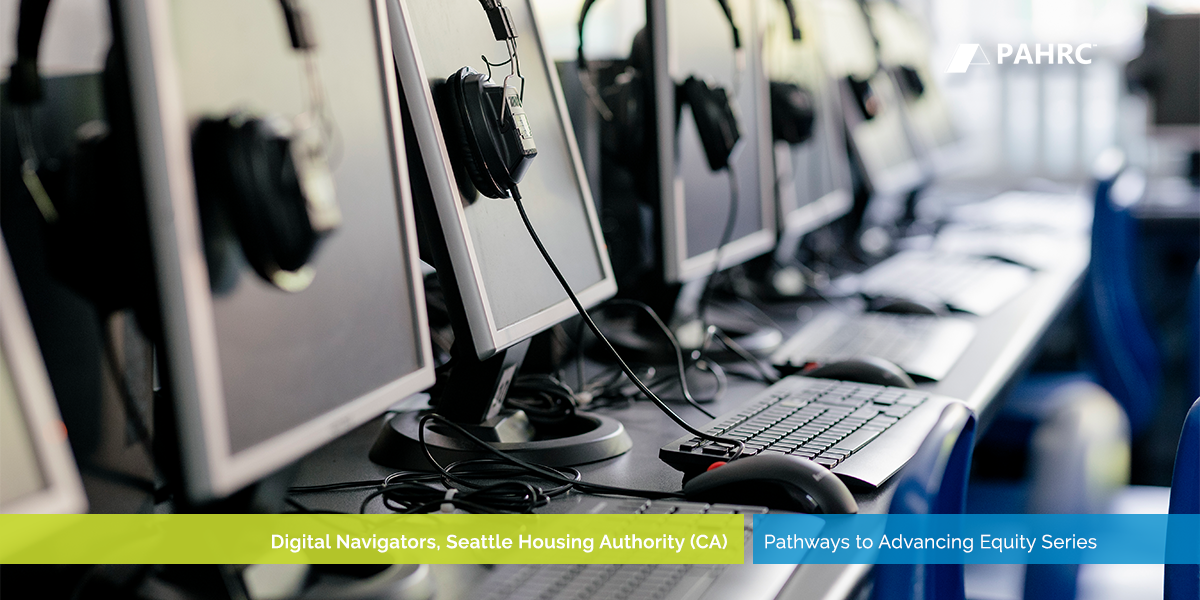The internet is a standard amenity for many households, providing access to vast information and connecting people worldwide.
However, not everyone is fortunate enough to have internet access. Those without it miss out on educational and job opportunities, information for making informed healthcare decisions, and platforms for paying bills, among other essential services.
Recognizing that their residents are often disproportionately affected by a lack of digital access, the Seattle Housing Authority (SHA) established the Digital Navigators program to promote inclusivity and equity
SHA's Digital Navigators program is featured in “PHA Pathways to Advancing Equity,” a report released by the Public and Affordable Housing Research Corporation (PAHRC), a member of HAI Group’s family of companies.
Challenge
At the time of the PAHRC study, approximately 65% of SHA residents lacked digital access, compared to only 15% of households in Seattle.
Solution
Through the Digital Navigators program, SHA staff promotes digital equity by launching a bimonthly electronic newsletter, providing access to computer labs, offering free Wi-Fi, delivering digital skills training, and installing adaptive technology. They have also set up free Wi-Fi in many of SHA’s public areas.
Additionally, Digital Navigators connect young SHA residents with families in the community who need digital education.
Implementation
Data Collection Push
In 2018, the Seattle Housing Authority (SHA) initiated a data collection effort to expand its database of email addresses and phone numbers for residents. To kick off the project, SHA confirmed existing contact information and mailed nearly 7,000 letters to residents with missing details. In a bid to promote inclusivity, these letters were translated into 17 languages.
At the same time, SHA launched “The Voice,” a bimonthly newsletter designed with enlarged text and interactive links, ensuring accessibility for all residents. The newsletter is also translated into multiple languages, assisting those who have difficulty seeing or do not speak English.
Additionally, the campaign introduced a cell phone text program to educate and alert residents about kindergarten enrollment events, scholarship funding, and employment opportunities. This comprehensive approach aims to enhance digital access and improve communication within the SHA community.
Digital Equity
SHA residents can access computer labs, free WiFi, digital skills training, and adaptive technology across numerous properties. Since 1999, SHA has provided free access to computers equipped with assistive technology to support career development and personal growth for residents with limited mobility or hearing and vision loss through the Special Access Technology Resource (STAR) Seattle public computer lab at their Center Park property.
The adaptive technology available at STAR includes:
- Half-QWERTY keyboards: Designed for one-handed typing.
- Tracker One: A device that enables individuals with limited hand control to use head movements to guide a computer mouse.
- IntelliKeys: A customizable keyboard that simplifies typing for individuals with physical, cognitive, or visual disabilities.
- ZoomText: A screen magnification and reading program that enlarges text and reads it aloud for individuals with blindness or vision impairments.
- Dragon NaturallySpeaking: A voice recognition software that allows individuals with vision impairments to dictate text.
- JAWS: A screen reader that converts text to speech and Braille for individuals who are blind or visually impaired.
- Word Q: A word prediction tool that assists with writing.
- Large monitors, keyboards, and mice: Available to support users with limited dexterity.
These resources play a vital role in promoting digital equity and empowering SHA residents to enhance their skills and integrate more fully into the digital world.
Free Wi-Fi
From 2019 to 2020, SHA installed free Wi-Fi in the public areas of many buildings, completing installations across 111 properties within two years. In 2020, SHA partnered with Seattle Public Schools and an internet service provider to connect over 50 families with free basic internet and mobile hotspots.
This initiative not only enhances digital access for residents but also fosters educational opportunities and community engagement, helping bridge the digital divide for those in need.
Digital Navigators
SHA officially launched the Digital Navigators program in 2020 to enhance the digital skills of families in need. This initiative connects young SHA residents with families requiring digital education, fostering a community approach to digital literacy.
The authority actively advocates for residents by promoting legislation aimed at increasing digital access. In partnership with organizations such as CLPHA, the Somali Family Safety Task Force, and Senator Patty Murray’s office, SHA champions efforts for emergency broadband access and affordable in-unit internet for low-income individuals and families.
In collaboration with the Multimedia Resources and Training Institute and the City of Seattle, SHA conducted a digital equity needs assessment survey to develop resident-informed strategies that help families access the internet, electronic devices, and digital education.
In 2022, SHA expanded the program with the support of the Washington State Department of Commerce, securing over $5 million in grants. This funding enabled the distribution of 2,000 laptops and provided residents with essential resources to:
- Set up their devices.
- Sign up for reduced-cost internet service.
- Create email accounts for SHA’s online portal.
- Apply for transit cards and more.
Additionally, SHA partnered with the Seattle Public Library to lead a multilingual six-week digital skills course, running from December 2022 through February 2023. This course produced 36 graduates, each receiving a certificate of completion and a new laptop.
Funding from the grants also facilitated the hiring of permanent digital navigators, technology support staff, and digital equity specialists, including a digital equity manager, to assist all residents in accessing, navigating, and thriving in the digital landscape.
In 2022, SHA also launched a pilot program for improved internet connectivity. Recognizing security risks associated with public WiFi, SHA installed free in-unit internet access in eight buildings, covering 495 units. This initiative prioritized digital equity in its design, focusing on buildings with a high population of residents of color, who historically face greater challenges in digital inclusion. The aim is to enhance residents’ digital equity through secure internet connectivity and the development of device and digital navigation skills.
Impact
SHA made significant strides in expanding digital equity by distributing 2,000 electronic devices to residents and installing free public internet access in over 100 properties. Additionally, the organization provided free in-unit internet access for 495 homes across eight buildings. These efforts contributed to a remarkable 45% increase in the digital contact information of residents, enhancing their ability to connect and access essential services.
Conclusion
SHA’s program exemplifies how targeted initiatives can effectively bridge the digital divide, equipping residents with the essential tools and resources needed to thrive in an increasingly digital world. Through innovative partnerships and community-focused efforts, SHA has made significant strides in advancing digital equity, ensuring that more residents can access the myriad opportunities the internet provides.
For further insights and similar case studies, refer to the full report using the button below.
This article is for general information only. HAI Group makes no representation or warranty about the accuracy or applicability of this information for any particular use or circumstance. Your use of this information is at your own discretion and risk. HAI Group and any author or contributor identified herein assume no responsibility for your use of this information. You should consult with your attorney or subject matter advisor before adopting any risk management strategy or policy.






